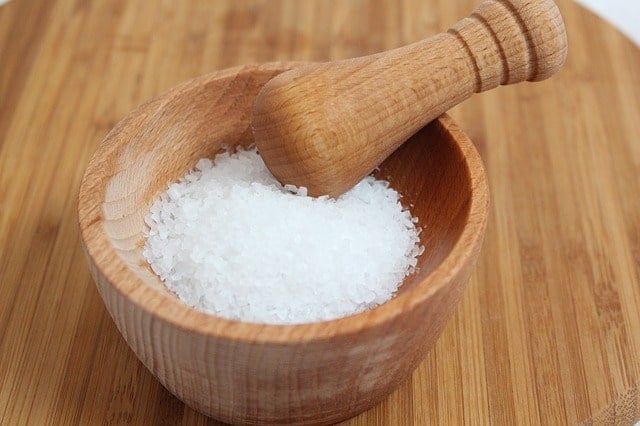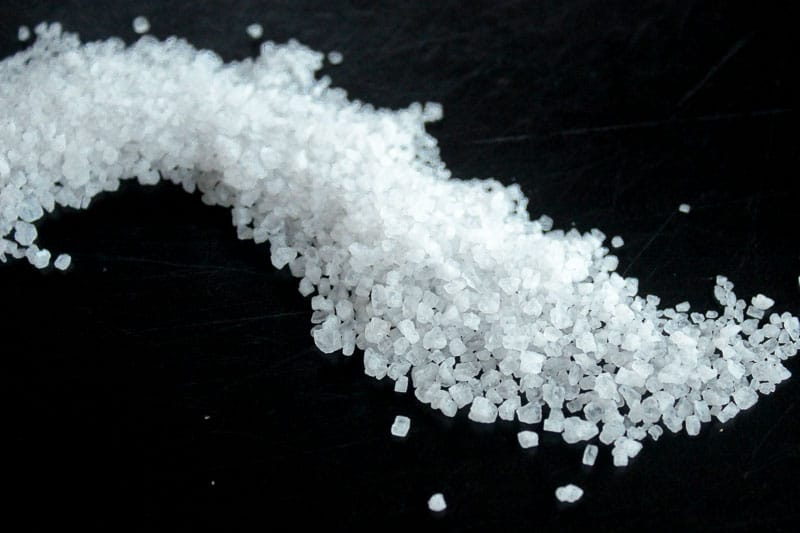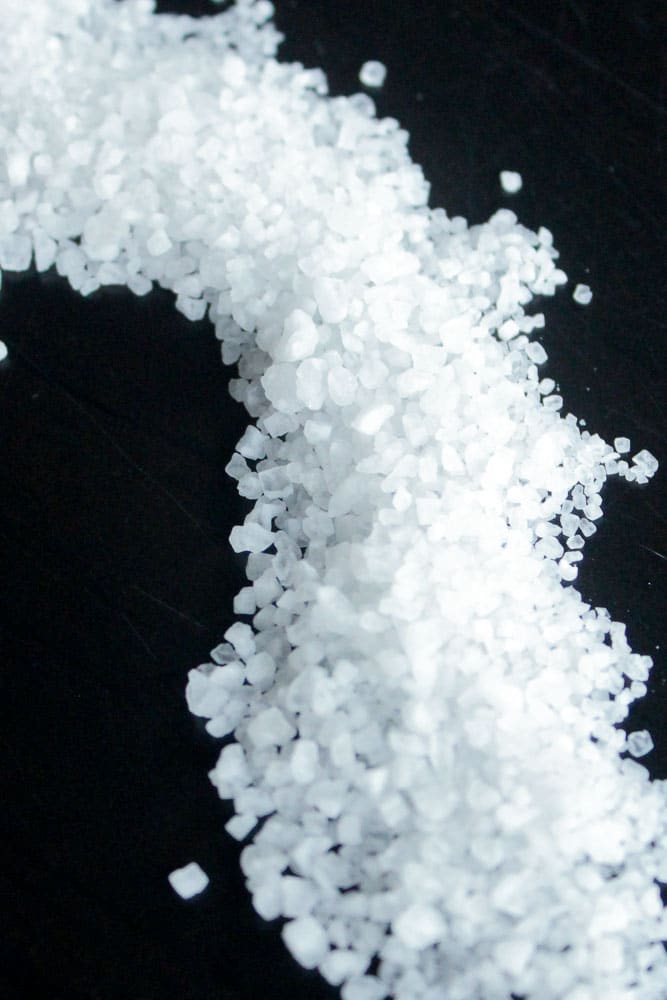The most important ingredient in your kitchen isn’t anything expensive or hard to get your hands on. It’s super simple and absolutely essential to great cooking. If you’re not using salt in your cooking you’re selling yourself short. Learn to use salt in your cooking and become a better cook today.

This post contains affiliate links.
Recently I told you guys all about my love for my favorite food, cheese. But cheese isn’t even close to my favorite cooking ingredient (although it can be pretty great).
My favorite ingredient, by miles and miles, is salt.
Ideally, kosher salt or sea salt, but in a pinch (hehe) even the humble table salt will do.
Salt, my friends, is a miracle worker. A game changer. A paradigm shifter.
It will take your cooking from meh to “Yeah!” If you don’t believe me, try it out.
Why You Should Use Salt In Your Cooking
People tell me all the time that they don’t use salt in their cooking. That they let people salt their own food at the table.
And I’m here to tell you something important: Unless you have a health condition that requires you to watch your sodium intake, if you want to be a great cook, you need to be using salt.
Salt has been WAY over demonized. If you’re eating a diet that’s relatively low in processed foods, chances are you have room in your diet to add a little flavor-enhancing salt to your cooking.
I married a man who didn’t believe in salt shakers. To this day, when I go to eat at my parents-in-law’s house, they get out the salt shaker especially for me.
But Laurier had his own little salt epiphany a couple of years ago.
I have a small business making artisnal hummus that I sell at our local Farmer’s Market. One day I was making a batch of Laurier’s favorite flavour and I forgot the salt. I taste test every batch (I own about 60 teaspoons for this purpose) and as soon as I tasted it I knew the salt was missing. The taste was flat and lifeless. It was totally bleh.
I got out a fresh spoon and took Laurier a sample to try.
“Guess what ingredient I forgot to add?” I asked him.
He guessed a few ingredients but finally guessed salt, probably because I was standing there grinning at him like a mad Cheshire Cat.
“Yes!” I told him. “Now wait here and I’ll bring you a taste with the salt.”
I brought him a taste once I had added the salt and even he, of little faith, could tell that it was infinitely better.
Salt enhances flavors. It brightens taste and makes ingredients pop. It allows your food to shine as its truest self. It is, without a doubt my desert island ingredient. Cooking is never the same without it.
How To Use Salt in Your Cooking
Even if you think you don’t use salt in your cooking, there’s a pretty good chance you use some type of sodium. Ever use soy sauce in a recipe? What about onion soup mix or a can of soup? Ketchup? Fish sauce?
If so, you’re using a hefty dose of sodium.
So enough with the salt bashing over there.
If you’re a dedicated salt non-user, I offer you a challenge:
Make something and use salt. If it’s in the recipe, use the salt it calls for. If you’re doing something more straightforward, like cooking vegetables (using ANY method), add a little salt before you eat them. Better yet, add a little butter, salt and pepper. If you don’t find it tastes better, either you did something wrong, or I don’t believe you 🙂 Get over here and let me cook you some vegetables the way they are meant to be cooked.
The way I like to use salt in cooking is to season a little bit at a time as I go. If I’m making a pot of spaghetti sauce I’ll start by sauteing the onions and garlic in some olive oil and I’ll add a little salt to them. When I add hamburger and break it up, as it starts to fry, I’ll add some salt. Later, when I add veggies and tomatoes and whatever else, guess what else goes in the pot? Salt.
Those of you who don’t use salt are probably gasping in horror right now and imagining the saltiest pot of spaghetti sauce you’ve ever eaten. Nope. Just delicious, flavorful, well-rounded spaghetti sauce. Taste as you go and make sure that every stage tastes its best. Not salty, just perfectly yummy.
Ideally, you don’t want to cook your entire dish and just salt it at the end, because the salt doesn’t get to cook into every level and become incorporated into the taste. I suspect you would find the end result much saltier. If you’re someone who only uses salt at the table, why not try using a little throughout the cooking process instead?
Types of Salt to Use In Your Cooking
Kosher Salt:
My absolute favorite type of salt to use is kosher salt. It has great flavor, is super cheap and is available at most large grocery stores (and maybe even some smaller ones).
I keep it in a sugar dish so I can grab a large pinch (with clean hands) and season whatever I’m cooking. After cooking with it for a while you’ll start to know, by feel, how much you should be using.
Also, I LOVE roasting vegetables with olive oil, kosher salt and pepper and crunching the melty kosher salt in my teeth as I eat, like in this recipe for Simple Oven Roasted Asparagus. You can do this with almost any vegetable, as long as you adjust the cooking time. Most delicious veggies ever.
Table Salt:
I usually use table salt when I’m baking or when it’s called for in a recipe I’m following. You’ll read a lot of bad things about table salt from chefs, who say it has a chemically taste or is too fine and hard to use in a predictable way.
However, I really think that for anyone new to using salt, and most regular people (myself included, of course), table salt is just fine.
Plus it has the added advantage of probably being in every kitchen or pantry in North America already. So you can just skedaddle in there and start experimenting with cooking with salt right away 🙂
Sea Salt:
Sea salt varies a lot, but it usually has a great flavor. It can be fine or coarse and can often be an excellent substitute for either kosher salt or table salt. If the grind is really large you may have to chop it or crush it a little more so you don’t get any really big pieces.
That’s about all I have to say about salt for today! Catch me on another day and I might have more to add! There have been entire books written about salt.
If you’re a dedicated salt-user in your cooking I’d love to hear from you. If not, I really hope you’ll take me up on my challenge to try cooking one or two things using salt. Let me know if you notice a difference! 🙂




Leave a Reply